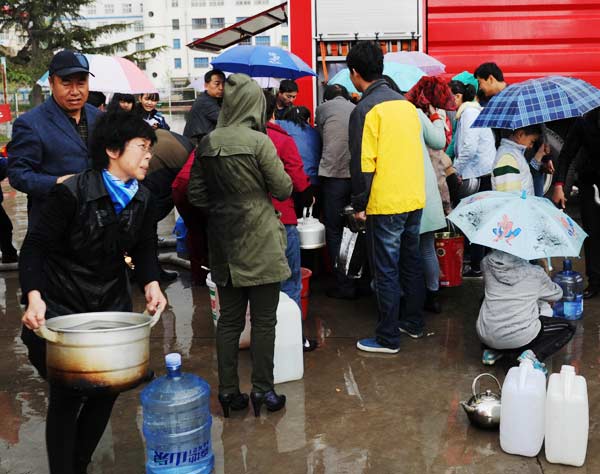Response to tainted water raises concerns
|
Residents line up to get water in Lanzhou, Gansu province, on Saturday. Experts and residents have raised questions over the delayed response and lack of timely information from authorities and the water supplier. Photo by Xue Chaohua / China Daily |
As local authorities in Lanzhou, Gansu province, continued to investigate the city's tap water contamination on Sunday, experts and local residents have raised questions over the delayed response and lack of timely information from authorities and the water supplier.
The contamination was caused by a residual oil leak stemming from an oil tank explosion in 1987 and a fire in the residual oil pipeline, according to a preliminary investigation by the city government.
Authorities suspect the residual oil contaminated the underground water near a duct between two water works, bringing hazardous levels of benzene into the city's tap water, the city government said on Sunday.
The local authorities have pumped more than 800 metric tons of water containing the residual oil from 26 pits that were dug near the tap water channel, it said.
High levels of benzene, which reached 118 micrograms per liter, were first detected in the city's tap water at 5 pm on Thursday, and the levels reached 200 micrograms per liter at around 2 am on Friday. Under national standards for tap water, the level of benzene must not exceed 10 micrograms per liter.
However, the hazardous level of benzene was not made public until around 12 noon on Friday when Xinhua News Agency published the first report on the pollution. In a micro-blog post, the city government confirmed the contamination at around 4 pm on Friday, close to 23 hours after it was first detected, and it advised residents not to drink tap water for the next 24 hours.
The slow response from the authorities has drawn criticism from residents.
"We wonder what the authorities and tap water supplier were doing during this time period. If the water is poisonous, why not tell us stop drinking it as soon as possible," said Dong Junde, 33, who lives in the city's Chengguan district.

















